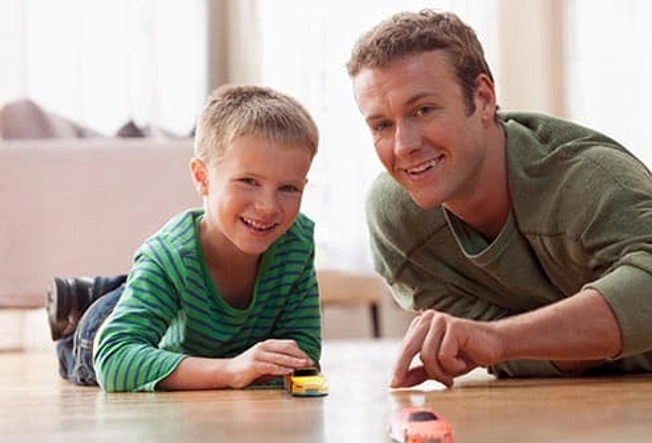Slideshow: How to Have a Healthy Day From Morning to Night


6 a.m. -- Banish Your Snooze Button
Does your family always need “just 10 more minutes?" Did you know that extra snoozing may be leaving you less rested?
Short, disrupted sleep cycles can make you and your kids groggy. Instead, pick a wake-up time and make sure you and your kids stick to it -- even on the weekends. (The same goes for your bedtime at night.) A consistent sleep schedule will make mornings easier.

6:30 a.m. -- Plank It Out
Start your day on a fit note with one exercise that strengthens your whole body: the dolphin plank.
Lie flat on your stomach, and then push yourself up onto your elbows and your toes. You want your back straight, abs tight, and forearms on the ground. Hold your neck straight, too. Work your way up to holding it for 1 minute.
You can do the plank almost anywhere (beside your bed, on the bath mat, in front of the TV). Plus, it's easy for kids to learn. Get them planking in the morning, too.

7 a.m. -- Break for Breakfast
Breakfast has so many benefits! Eating well early in the day gives you fuel for your body and your mind. Plus, it can help you feel satisfied enough to say no to unhealthy snacks later on.
The best breakfasts have a protein-carb combo. Try an egg on whole wheat toast, almond butter spread on an apple, or low-fat yogurt with fresh berries.

8:30 a.m. -- Relax on Your Commute
Finding times throughout your day to relax is an important part of being healthy. Surprisingly, your commute is a good place to start.
Join a carpool, or take the bus or train. Then, you may be able to read or listen to music to relax. Or can you work flexible hours to avoid peak traffic, or telecommute one day each week?
Every little bit of stress management matters. So teach your kids to find small moments during the day to chill, too.

Noon -- Recharge During Lunch
Relaxing will help you regain energy so you can be mindful of the choices you make. Use your lunch break to eat and take a sanity break, even if it's short. Go for a walk around the block. Or find a private spot and feel yourself breathe for a few minutes to get refreshed.
At home, teach your kids these stress-busting tricks and the importance of relaxing to re-energize and refocus.

3:30 p.m. -- Snack Smart
Avoid the high-sugar trap of candy or the vending machine when your blood sugar drops mid-afternoon. At work, keep healthy snacks at your desk or in a bag. At home, make healthy afternoon snacks available for your kids.
Choose a combo of protein and carbs to give you a slow release of energy. Think apple slices and peanut butter, whole-grain crackers with reduced-fat cheese cubes, or small containers of veggies and hummus.

5:30 p.m. -- When You Get Home, Take It Outside
You book time for meetings, business trips, doctor visits, and parent-teacher conferences. Make family exercise time just as important by putting it on your calendar, too.
One easy option that works for every age: a family walk. Start by scheduling a half-hour walk around the neighborhood at least 3 nights a week. Try it as soon as everyone gets home or right after dinner. (The dishes can wait!)

6:30 p.m. -- Fit in Family Dinner
Family mealtimes have all kinds of benefits for your kids. Research shows that the more meals a family shares together, the better off kids are emotionally, and they're less likely to be overweight.
How to make a family dinner happen? It may mean saying no to a few other items in your schedule. Do you need to be on that committee? Does your child need to play three sports? Just remember how good family dinner is for you all in the long run.

7 p.m. -- Mind Your Chores
Nighttime is time to wind down for a good night’s sleep. Many people say meditation helps them relax.
Try "mindfulness meditation" with your evening chores. Teach your kids that whether you're washing dishes, folding laundry, or picking up stuff, focus all your attention on your task. Turn off the TV or other distractions.
Be fully present in the moment -- don’t think about what’s next or tomorrow. Being present is mindfulness, and it may help ease your stress.

7:30 p.m. -- Be a Kid
Take 15 minutes every evening to get down on the floor and play with your kids. Focus on them and nothing else: not your smartphone, not the TV.
If all your contact with your kids is about screen time, homework, chores, and getting in and out of the house, you'll all be drained, stressed, and unhappy.
Plus, turning off screens at least an hour before bed can help everyone fall asleep easier. The bright light from the screen stops your brain from making you sleepy.

Give Yourself a Bedtime
When you have healthy sleep habits, you model good examples for your kids to follow. Plus, a lack of sleep makes it hard to make healthy choices to eat right and be physically active. Our bodies respond best to a reliable sleep schedule, rather than staying up late some nights and waking up late on weekends.
